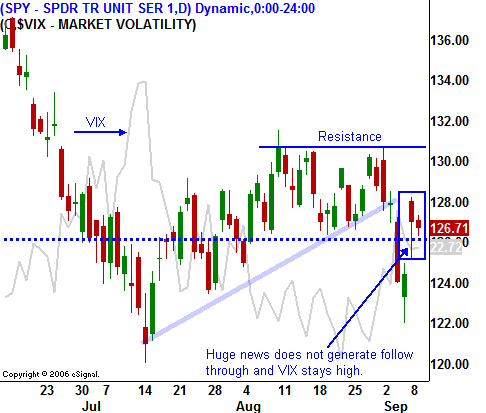Bailout Buys Time – Problem Still Looms – Favor the Downside.
Last week, the market sold off dramatically ahead of the Unemployment Report. As expected, the results were concerning. The jobless rate rose to 6.1%, up from 5.7% the previous month. Unemployment also increased by more than 50,000 jobs in June and July. Friday's market reaction was rather subdued given the huge decline on Thursday.
The last three Unemployment Reports have generated selling on Monday. I expected the market to decline in the early part of this week. The government threw a curveball when they bailed out Fannie Mae and Freddie Mac. The market gapped up a huge and shorts scrambled to cover.
This was a widely expected move and the government was forced to play its last trump card. Financial markets were getting nervous and investors were perplexed over the delay. The nationalization of mortgages helped to stabilize credit markets. The government has assumed the risk and they have deep pockets to weather the storm. Like an emergency room doctor, the government has demonstrated that they will do everything they can to save the patient.
The bottom line is that people own more home than they can afford. If lenders force them into foreclosure, a domino effect could take hold and home prices would plunge. This could jeopardize the entire financial system as the assets devalue. The government has access to capital and over the next few years, this bailout will force them to issue new debt.
One out of every ten homeowners has no equity and many are "underwater". The government hopes to keep people in their homes long enough to reverse this situation. Once the asset increases in value, people will be able to sell their homes and make good on their loans. In a worst-case scenario, they would have walked away from their mortgages, straining the financial system. That would normally be fine, except that this time the problem was too widespread (the two largest GSE’s accounted for half of all mortgages).
Taxpayers will shoulder the burden for poor lending decisions. In the short term, our national debt will increase and the dollar will suffer. In the long-term, this problem should resolve itself. Once again, the US has "mortgaged the future". As a nation, we spend more than we make and that has to stop.
People keep asking, "How did we get here?" This problem has been brewing for decades and it is reaching a critical point. Unfortunately, no presidential candidate will ever get elected if they stress saving money - that would send us into a deep recession. The alternative is to maintain our gluttonous ways until the entire house of cards comes crumbling down.
In another 12 years, 100% of our national budget will be spent on interest on our national debt and on entitlement programs (Social Security, Medicare...). Think of the implications! There’s nothing left for education, defense, infrastructure or dozens of other necessities. How can this country maintain its global status if it has no money?
Baby boomers are starting to retire and 60% of them have less than $100,000 saved. A major roadblock stands in our way and if we act now, we can avoid a financial disaster. That does not mean that we won't struggle along the way.
I do not envy either presidential candidate and I believe they are faced with an impossible situation. Everyone wants to point fingers and no one wants to take responsibility for their own personal decisions.
Enough gloom and doom.
The market had a muted response to yesterday's news. A financial meltdown has been postponed and perhaps avoided. The government has fired its last bullet and they did not get the desired reaction. Stocks rallied on the initial news, but today they are trading down. The crux of the problem still exists.
As a nation, the economy is slowing and our debt levels are at all-time highs. Last week's Unemployment Report will weigh heavily the rest of the week. This Friday, the PPI could spark a rally and we might start seeing some signs of relief as commodity prices continue to fall. However, that is largely expected by the market and the rally will be short-lived.
During this quiet week, I need to look to ahead for a driving force. The FOMC will meet and it is unlikely that that event will drive the market. Bond prices imply that interest rates will not be going up for the remainder of the year and the Fed is likely to cite weak economic conditions and moderate inflation. Perhaps the bigger release next week will come from investment bankers such as Goldman Sachs, Morgan Stanley and Lehman when they announce earnings. This morning, Lehman is down substantially and it appears that the Korean Development Bank takeover is not going to happen. I will also be watching earnings from FedEx. Their earnings should improve due to lower fuel costs; however, it's their shipping outlook that will be of greatest importance. Their guidance is often considered a barometer of economic activity.
The VIX stayed elevated even after yesterday's news and uncertainty continues to plague the market. We are in a seasonally bearish period and we have breached horizontal support at SPY 126. Consequently, I still favor the downside.


Daily Bulletin Continues...

